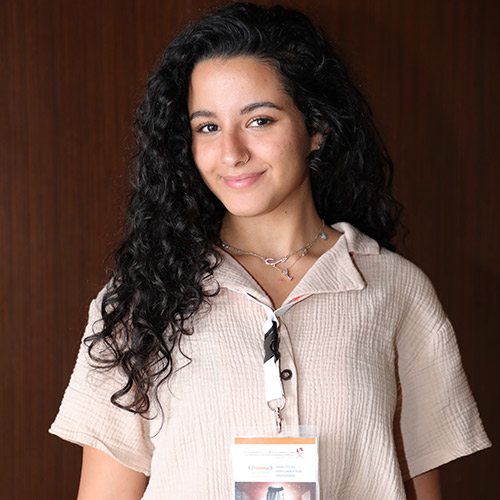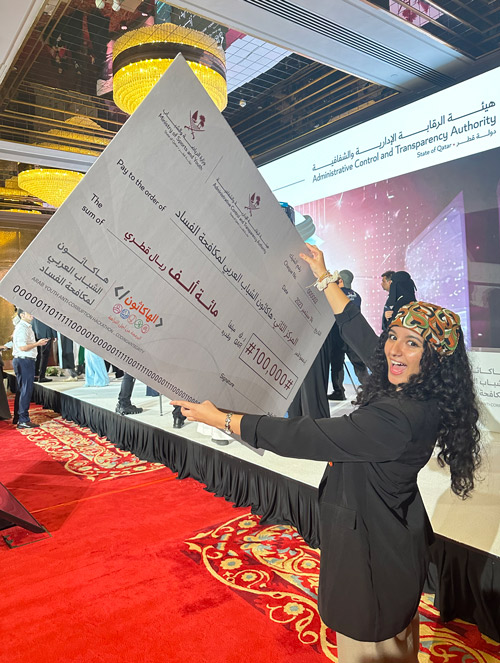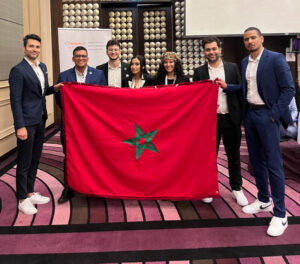
Computer science and psychology major wins second place in hackathon

Yasmine Fazazi ’24 won second place with her team at the Arab Youth Anti-Corruption Hackathon in September. The event, which took place in Doha, Qatar, was sponsored by the United Nations Office on Drugs and Crime. Fazazi, a computer science and psychology major with a minor in data science, competed as part of the Moroccan team. They won the equivalent of $27,430.
Her team’s challenge was “Innovating Education: Ensuring the Digitalization of Educational Systems Upholds Values of Integrity, Ethics, and Transparency,” which prompted participants to address how artificial intelligence can be used ethically in education systems. Fazazi’s team developed a chatbot that could be used in online testing that would restrict what a student could access while also guiding the student in a helpful way. “We came up with a solution incorporating artificial intelligence to ensure more integrity and ethics during online test-taking,” Fazazi said.

Yasmine Fazazi and her teammates, students from Al Akhawayn University in Morocco, won a prize of 100,000 Qatari rials, which is equivalent to $27,430.
The new experiences that the hackathon afforded her excited Fazazi. “The hackathon took place in Doha, Qatar, which I never had the chance to visit,” she said. “I also had the opportunity to learn and grow alongside talented individuals representing 17 different countries. I carried the flag of Morocco with pride and contributed to a meaningful cause.”
Fazazi first discovered her interest in artificial intelligence while participating in AMRE, Wooster’s Applied Methods and Research Experience program. She said that the College’s liberal arts curriculum also helped her succeed in the competition. “Wooster helped me become a more well-rounded person, which allowed me to blend knowledge and skills from various disciplines to make meaningful contributions to our project,” Fazazi said.
Fazazi is also studying artificial intelligence for her Independent Study, with merges psychology and computer science. “I am developing a mental health app, and incorporating an artificial intelligence companion chatbot providing support and resources to its users,” Fazazi said. “I will also be looking at how previous experience with large language models, like ChatGPT, affect perceptions of artificial intelligence incorporation in the mental health field.”
She said that participating in the hackathon reinforced her interest in this field. “The hackathon reaffirmed my passion for artificial intelligence along with the design of interfaces that are aesthetically pleasing, efficient, and user-friendly,” Fazazi said. “All of these are goals I have for my I.S. and professional career.”
Fazazi was proud to win second place, and hopes that her story can inspire other people like herself to become involved in this field. “I’m deeply thankful for the opportunity to share my story and embrace these positive experiences. It’s my hope that by doing so, I can contribute to the empowerment and encouragement of women and other minorities in technology fields, inspiring them to pursue their passions, break down barriers, and promote diversity and inclusion in this rapidly evolving field,” she said.

Yasmine Fazazi and her teammates pose with the Moroccan flag and their mentors at the competition.
Posted in Experiential Learning, News on October 4, 2023.
Related Posts
Related Areas of Study
Psychology
Do research, work with faculty mentors, and tailor a psychology program to your interests
Major MinorComputer Science
Solve complex problems with creative solutions using computer programming and applications
Major Minor

